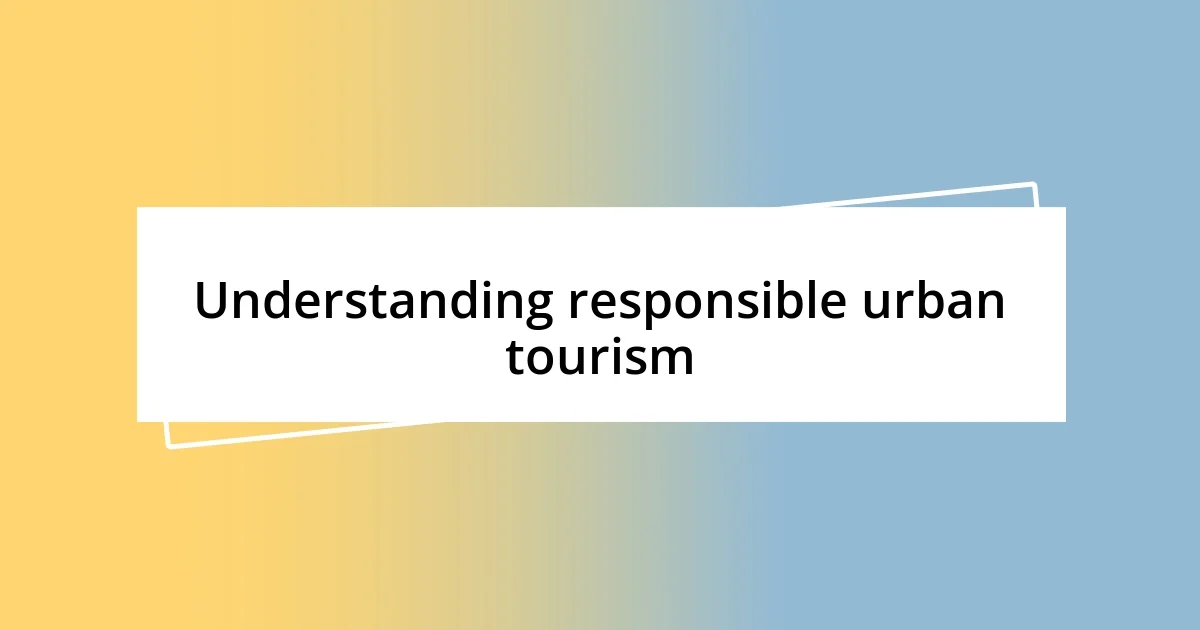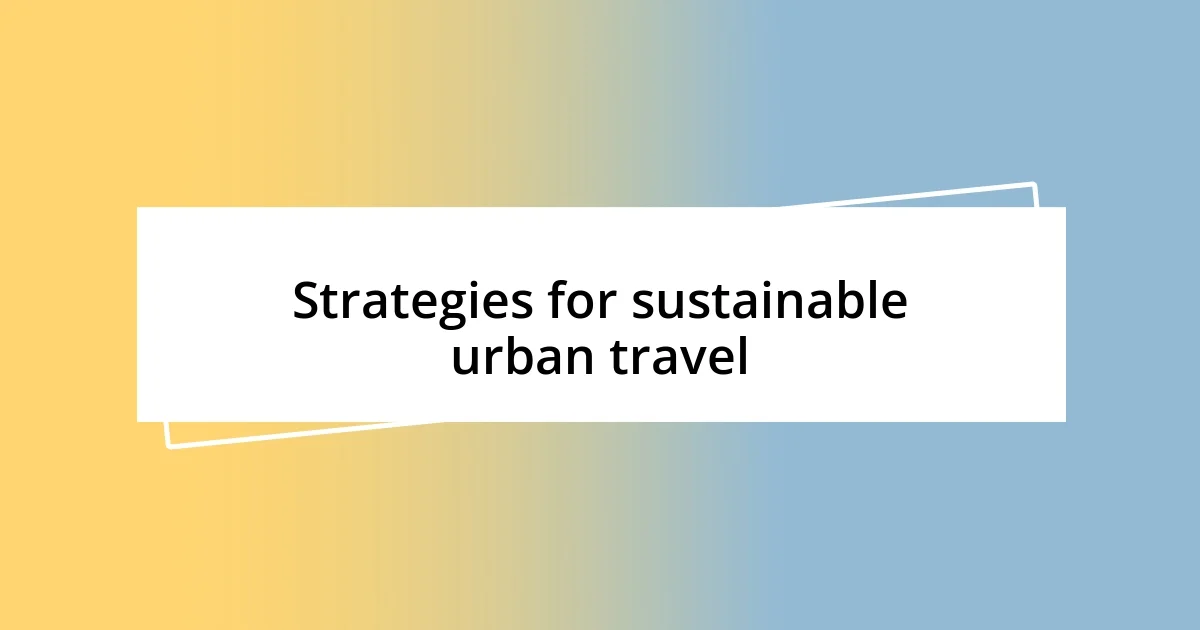Key takeaways:
- Responsible urban tourism balances enjoyment of local culture with respect for the community and environment, enhancing travel experiences and supporting local businesses.
- Engaging with locals and understanding their stories fosters cultural exchange and deeper connections, transforming the perception of tourism from passive visiting to active participation.
- Key principles include respecting local customs, choosing sustainable options, and supporting local artisans, which together contribute to sustainable tourism and community enrichment.

Understanding responsible urban tourism
Responsible urban tourism is all about striking a balance between enjoying a city’s vibrant culture and ensuring that our presence doesn’t harm the local community or environment. I’ve often found myself pondering, how can we explore new places while still respecting their essence? It’s a valuable question, and it nudges us to consider the impact of our choices during our travels.
When I think of responsible urban tourism, I recall a trip to Amsterdam, where each bike ride felt like a celebration of local life. Instead of dropping into large tourist traps, I opted for small, family-run cafes that welcomed me with warmth and genuine conversation. This experience not only enriched my understanding of Dutch culture but also supported local businesses in a meaningful way.
Moreover, responsible urban tourism encourages us to be mindful travelers. It prompts us to dig deeper—what are the stories behind the neighborhoods we wander through? I often engage with locals and listen to their narratives, which profoundly transforms my perspective. This kind of tourism invites us to be part of the community temporarily rather than just visitors passing through.

Benefits of responsible tourism practices
Embracing responsible tourism practices offers numerous benefits that ripple through the community. For instance, by supporting eco-friendly businesses and local artisans, I often feel a sense of connection that enriches my travel experience. One memorable trip to Kyoto taught me just how significant this can be; by purchasing handmade pottery from a local craftsman, I not only took home a unique souvenir but also contributed to the preservation of traditional Japanese crafts.
Additionally, responsible tourism can lead to improved community relations and cultural exchange. When travelers like us choose to immerse ourselves in local traditions, we foster understanding and respect. I remember participating in a cooking class in Peru where the chef’s grandmother taught us her family recipes. It was an emotional experience that went beyond just learning how to cook—it opened a window into her life and heritage.
Ultimately, these practices lay the groundwork for sustainable tourism, preserving destinations for future generations. I’ve noticed that places thriving on responsible tourism often thrive in terms of both economic viability and cultural vibrancy. It’s incredibly fulfilling to think that my choices while traveling can contribute positively to the world around me.
| Benefit | Description |
|---|---|
| Supports Local Economies | By choosing local businesses, we help ensure that tourism dollars stay within the community. |
| Encourages Cultural Exchange | Engaging in local traditions fosters understanding and appreciation of diverse cultures. |
| Promotes Environmental Stewardship | Responsible practices help protect natural resources and sustain the environment for future travelers. |

Key principles of responsible tourism
When I reflect on the key principles of responsible tourism, I realize that they really hinge on respect and awareness. It’s about appreciating not just the destination but the people and culture that make it unique. I recall walking through a vibrant market in Barcelona, where I consciously tried to learn a few Catalan phrases to engage with vendors. That effort, albeit small, was met with smiles and warmth that made the experience unforgettable. It reinforced my belief that when we show genuine respect, we’re welcomed and, in turn, create a more enriching travel journey.
Here are some fundamental principles to consider:
- Respect Local Cultures: Be mindful of local customs and traditions. Each culture has its own unique practices, so learning about them deepens the experience.
- Engage with the Community: Strike up conversations with locals. Their stories can offer insights you won’t find in a guidebook.
- Choose Sustainable Options: Support businesses that prioritize environmental sustainability. For example, I always opt for eco-lodges or tours that follow green practices.
- Minimize Environmental Impact: Make conscious choices, like reducing waste and avoiding single-use plastics. Every small step contributes to a larger change.
- Educate Yourself: Prior to visiting, do some research about the destination’s history and social dynamics. Understanding context fosters respect and empathy.
Reflecting on these principles can really transform how we approach our travels. It deepens our connection to the places we visit and the people who call them home.

Strategies for sustainable urban travel
One effective strategy for sustainable urban travel is utilizing public transportation. I remember navigating the intricate subway system in Tokyo during my last visit; it was a thrilling experience that not only saved me money but also allowed me to mingle with locals. Imagine the difference we can make if more travelers opt for buses or trains instead of taxis!
Another approach I find valuable is to choose accommodations that prioritize sustainability. On my recent trip to Amsterdam, I stayed at a green-certified hotel that utilized solar energy and offered organic meals. The joy of knowing that my stay supported eco-friendly practices added an extra layer of satisfaction to my trip. Isn’t it empowering to think that our choices can align with our values?
Finally, engaging in community-led tours can significantly enhance both sustainability and cultural exchange. I once joined a walking tour in Lisbon led by a resident who shared stories about the challenges and victories of local artists. This experience not only enriched my understanding of the city but also helped fund community initiatives. How often do we get the chance to make such meaningful connections while exploring a new place?

Engaging with local communities
Engaging with local communities enriches our travel experiences in ways we often underestimate. During a visit to a small fishing village in Greece, I decided to join a local cooking class. It was fascinating to learn how to prepare traditional dishes from a grandmother who had been doing it for decades – her laughter and storytelling brought the history of the food to life. When was the last time you learned something so meaningful directly from someone who lives it every day?
I’ve discovered that striking up conversations with locals can lead to unexpected gems. On a slow Sunday in a quaint café in New Orleans, I chatted with a local artist about her work and the influences behind it. Her passion was contagious, turning a simple coffee break into an unforgettable moment of connection. Isn’t it amazing how a few exchanged words can reveal the essence of a city?
Participating in community events is another wonderful way to immerse yourself in local culture. I remember attending a vibrant festival in Mexico City that celebrated traditional dance and music. Joining in the festivities made me feel like part of the community rather than just an observer. It reminded me that tourism is not just about the sights; it’s about the relationships we build and the stories we share. Wouldn’t we all benefit from stepping out of the tourist bubble and embracing local life more fully?

Supporting local businesses effectively
Supporting local businesses is a fundamental aspect of responsible urban tourism. When I traveled to a bustling market in Marrakech, I made it a point to buy spices directly from local vendors instead of larger supermarkets. The warm smiles of the artisans, coupled with the knowledge that my purchase supported their families, made the experience truly special. Have you ever felt that rush of joy knowing your money directly benefits a local?
I’ve also found that dining at family-owned restaurants often leads to some of the most authentic meals. During my time in Bologna, I stumbled upon a small trattoria where the chef’s grandmother still cooked traditional pasta. The flavors were unforgettable, but what struck me most was the personal stories that accompanied each dish. Wouldn’t it be great if more travelers sought out these hidden gems instead of the usual chain restaurants?
Additionally, I believe engaging with local craftsmen can create memorable experiences. In a cozy workshop in Prague, I observed a glassblower at work, shaping molten glass into stunning pieces. The passion he exuded for his craft was palpable, and buying a handmade ornament felt much more meaningful than a soulless souvenir. Isn’t it remarkable how such simple acts can cultivate a deeper connection with the places we visit?














